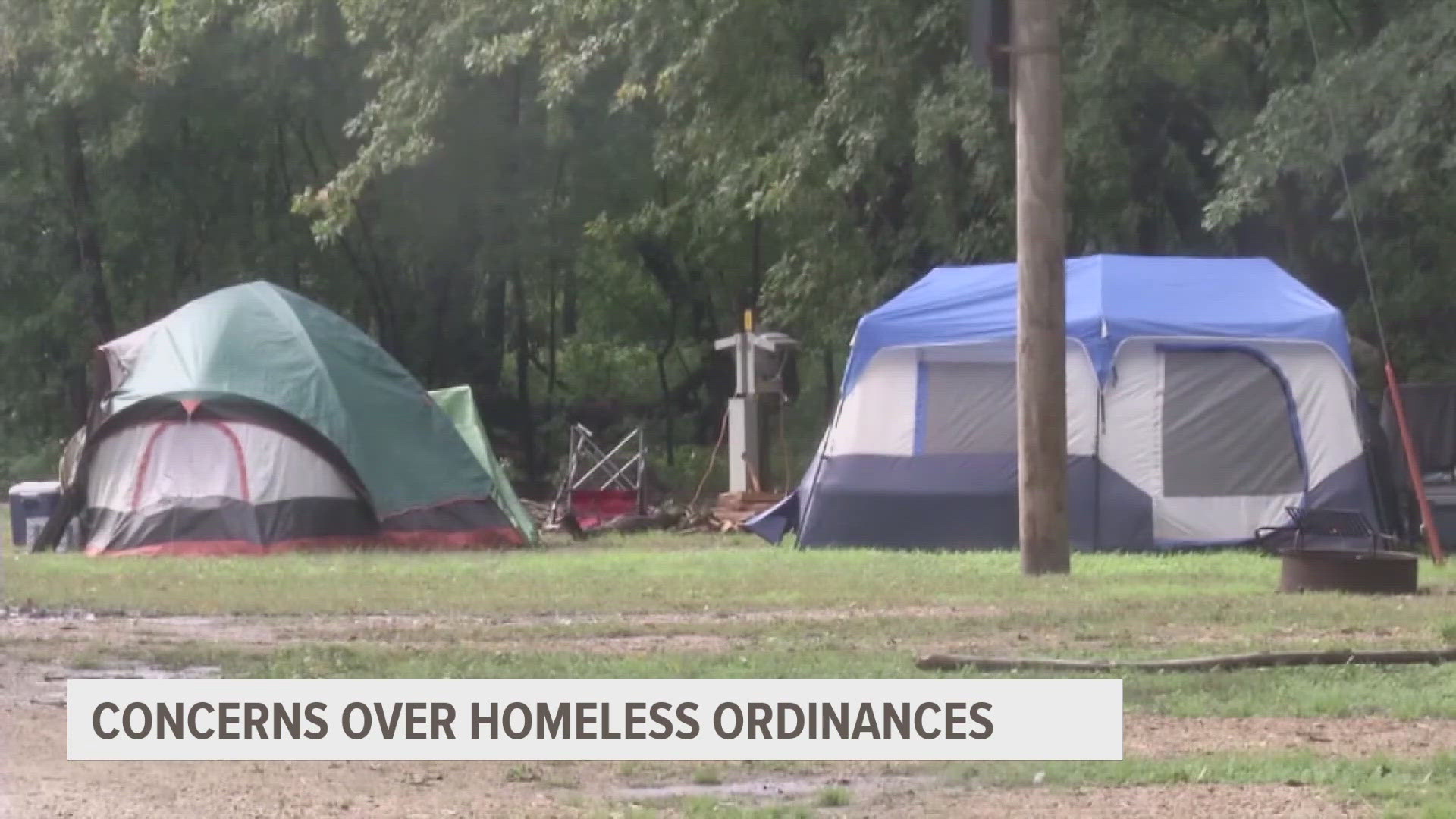DES MOINES, Iowa — Des Moines City Council is considering stricter ways of dealing with homelessness.
On Monday, an ordinance that bans camping on public property as well as sleeping in several outdoor public spaces passed its first reading. The ordinance states that people would have to immediately leave the camp at the time of the notice and would have at least 24 hours to remove their items. During city council's Monday work session on homeless ordinances, officials said the city will give a heads up to a local agency about the camp's location so that service providers will be on-site.
Another ordinance shortening the amount of notice people get before abandoned camps are taken down also passed its first reading. Council member Chris Coleman clarified with Local 5 that this would also cover camps at which people weren't there when the notice was given.
Local 5 caught up with Homeward, Polk County’s homeless planning organization, about their concerns with the ordinances and how homelessness has evolved in Polk County.
Homeward’s Executive Director Angie Arthur says that until recent years, homelessness in Polk County was on a downward trend. Now, however, the numbers are rising.
“In what we call our "Point-in-Time Count" over the last few years, we’re seeing that the overall numbers are starting to increase a little bit... but we’re seeing a larger increase in folks that are experiencing unsheltered homelessness," Arthur said.
She points to the pandemic and a lack of affordable and accessible housing as the main contributors to the increase. Not only are those numbers rising, there’s also been a change in who becomes homeless.
“We’re seeing more seniors becoming homeless for the first time as older adults as well as right now we have a significant number of families that are experiencing homelessness," Arthur said.
That brings us to Homeward’s first concern with the proposed ordinances - Polk County not having enough resources.
“As of July 15th, there were 133 families on the wait list for family emergency shelter," Arthur said.
She says that Polk County's biggest shelters for single people, Bethel Mission and Central Iowa Shelter & Services, are often at capacity for beds, causing them to regularly use their overflow space.
"That could mean you're sleeping on a mat, you're sitting at a table, you're sitting in a chair or sleeping in a chair for that evening, or there could be some cots," Arthur explained.
She says that Homeward conducted a gap analysis this year that identifies where more resources are needed. Results pointed to more emergency shelter units for families, more basic emergency shelter units, and significantly more rapid rehousing and permanent supportive housing. While the language in the proposed ordinance says police will give someone found sleeping outside or camping a one-time transport or directions to a shelter to avoid a misdemeanor, there are multiple reasons why some people don’t go, according to Arthur.
“Maybe they have PTSD or some other challenges that staying in a large congregate setting might be challenging for them,” she said.
A homeless person also might not have a place to keep their pet, a couple might not be able to find a shelter arrangement in which they don't get separated, etc. Some of these barriers could be addressed under a resolution that passed on its first and final reading at Monday's special city council meeting. It encourages officials to set up an agreement with an animal services provider to give pets shelter while homeless people seek emergency shelter. It addresses other barriers to accessing emergency shelter as well.
It's important to note that that resolution is not binding. Arthur is also concerned about the proposed fine for violators. She says it just adds to the barriers they face.
RELATED: Neighbors raise concerns to Des Moines City Council over nonprofit's plan for affordable housing
“We know long-term that fines can have impact if you are wanting to renew your license, car registration, sometimes even finding housing," she said.
Council members have clarified that violators can appeal fines in favor of community service and that a lack of accessible shelter space would be seen as a valid argument against a misdemeanor. However, violators would still be cited. The ordinance also lists shelter space being "impracticable" as a valid defense.
In Monday's city council work meeting, the assistant city manager clarified what "very likely could be" used as a valid defense under the "impracticable" argument. It included a homeless person having PTSD, and therefore not being good with crowds, as well as a person who does not want to go to a shelter where their abuser is staying.
As for that appeals process, Arthur says she still has questions as to how it works. She also voices concern over people losing their things to camp clean ups. She says while the ordinance would offer temporary storage options, more details need to be figured out.
And that's not the only thing that needs to be fleshed out, according to Arthur.
"If the decision in the community is to move forward, what are those things that we're going to track and evaluate so that we can understand what any unintended consequences might be?" she said.
There was some confusion on what the procedure for removing people from camps would be and what enforcement would look like at Monday's work meeting.

